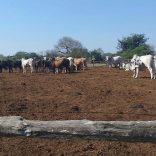Mozambique expects 23% increase in cashew nut production
Mozambique may be banned from international forest trade – AIM

FILE - For illustration purposes only. [File photo: DW]
Mozambique may be banned from international trade in endangered forestry species for not complying with regulations set by the Convention on International Trade in Endangered Species of Wild Fauna and Flora (CITES).
CITES is an international agreement that is focused on ensuring that international trade in wild animals and plants does not threaten the survival of these species. It also establishes rules and procedures for trade in endangered species, dividing them into different annexes according to the level of protection required.
According to Ernesto Witimane Júnior, from the Forestry Department at Maputo’s Eduardo Mondlane University (UEM), cited by the daily paper “Notícias”, Mozambique must adopt urgently measures to curb the smuggling of endangered forest species and safeguard government revenue.
The uncontrolled export of precious hardwoods, he said, represents not only a threat to biodiversity but also a significant loss of tax revenue that could contribute to the country’s economic development.
Witimane added that there is a need to adopt sustainable measures for exploitation of forest resources, including legislative and institutional reforms that involve local communities in the monitoring and management of natural resources.
“Trafficking networks that operate with impunity in the sector must be held accountable”, he said.
Mozambique is currently the world’s largest producer of black wood (pau preto), a highly valuable species. It is highly sought for the production of luxury furniture and musical instruments, especially in Asia and Europe. However, weak oversight and the rise of smuggling have placed the country under international scrutiny.













Leave a Reply
Be the First to Comment!
You must be logged in to post a comment.
You must be logged in to post a comment.